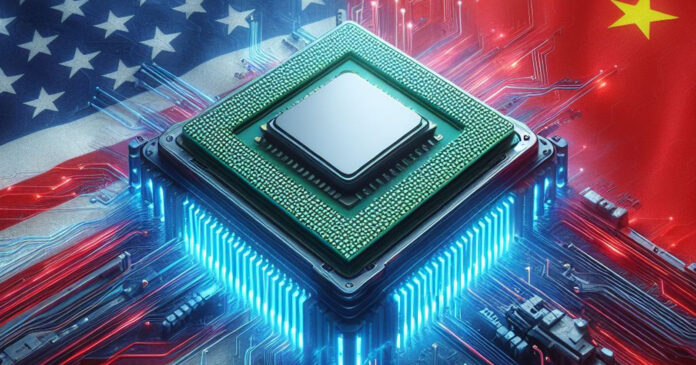
The ban on the use of US-origin products on government computers in China is a significant development that reflects the escalating tensions between the two economic powerhouses. The Chinese government’s decision to restrict the use of American processors and software, such as Intel, AMD, and Microsoft, is seen as a retaliatory measure against the US restrictions on processor imports. This move is not only aimed at reducing China’s dependence on US technology but also at bolstering its domestic tech industry.
China has long been striving to develop its own semiconductor industry and reduce its reliance on foreign technology. The ban on US products on government computers is a clear signal that China is determined to accelerate its efforts in this regard. By promoting the use of domestic processors and software, the Chinese government aims to strengthen its tech sector and enhance its national security by reducing the potential vulnerabilities associated with foreign technology.
However, implementing this ban will not be without challenges. China’s domestic tech industry still has a long way to go before it can match the quality and performance of US-origin products. The ban on US processors and software may result in a temporary setback for Chinese government agencies, as they may face compatibility issues and a learning curve when transitioning to alternative technologies.
Furthermore, the ban is likely to have broader implications beyond the government sector. As government agencies shift away from US products, there may be a ripple effect on the private sector as well. Chinese companies that rely heavily on US-origin technology may face difficulties in terms of software compatibility and performance, which could hinder their operations and competitiveness.
On the other hand, the ban presents an opportunity for domestic Chinese tech companies to step up and fill the void left by US products. This move is expected to spur innovation and investment in the Chinese tech sector, as companies strive to develop and improve their own processors and software. It could also lead to increased collaboration and partnerships between Chinese tech firms, as they work together to overcome the challenges posed by the ban.
Overall, the ban on the use of US-origin products on government computers in China is a significant development that underscores the growing tensions between the US and China in the tech sector. While it may pose short-term challenges, it also presents an opportunity for China to strengthen its domestic tech industry and reduce its reliance on foreign technology. The long-term implications of this ban will depend on how effectively Chinese companies can develop and improve their own processors and software to meet the demands of government agencies and the wider market.
New Guidelines for Government Computers
The new guidelines require most government agencies in China to opt for domestic alternatives instead of US products. Chinese companies like Huawei are being promoted as viable alternatives to Intel, AMD, and Microsoft. The Chinese government aims to transition to “secure and reliable” hardware and software, favoring products from domestic manufacturers.
While the ban on US products was announced in December last year, it has now been implemented as policy. All government agencies above the county level are required to comply with these new standards. However, it’s important to note that this ban does not extend to consumers or private companies.
The decision to promote domestic alternatives is seen as part of China’s broader goal to reduce its reliance on foreign technology. This move is in line with the country’s “Made in China 2025” initiative, which aims to transform China into a global technological powerhouse. By promoting domestic companies like Huawei, China hopes to strengthen its own technology industry and reduce its dependence on foreign suppliers.
Furthermore, the Chinese government’s emphasis on “secure and reliable” hardware and software reflects growing concerns about cybersecurity. With the increasing number of cyber threats and the potential for foreign interference, China wants to ensure that its government agencies have access to technology that is less vulnerable to external attacks. By using domestic products, the government believes it can better control and protect its sensitive data and infrastructure.
However, this shift towards domestic alternatives does not come without challenges. Chinese companies like Huawei still face scrutiny and suspicion from other countries, particularly the United States. The US government has raised concerns about potential security risks associated with Huawei’s products, citing allegations of backdoors and espionage. These concerns have led to bans and restrictions on Huawei’s involvement in 5G networks in several countries.
Despite these challenges, the Chinese government remains steadfast in its support for domestic technology companies. It has invested significant resources in research and development, aiming to enhance the capabilities and competitiveness of its homegrown companies. Additionally, the government has implemented policies and incentives to encourage the adoption of domestic products, such as offering subsidies and preferential treatment to government agencies that choose domestic alternatives.
Overall, the new guidelines for government computers reflect China’s determination to assert its technological independence and strengthen its domestic technology industry. By promoting domestic alternatives and reducing reliance on foreign products, the Chinese government aims to enhance cybersecurity, protect sensitive data, and foster the growth of its own technology sector.
Impact on US Companies
The ban on US products is expected to have minimal impact on Microsoft, as its sales in China are not heavily reliant on government contracts. However, both AMD and Intel stand to lose significant revenue as China accounts for billions of dollars in sales for these companies. This ban represents a significant change for both manufacturers.
The US has been taking steps to weaken China’s competition in the American artificial intelligence market by restricting the sale of powerful CPUs and GPUs. Additionally, the US is investing in domestic chip production to reduce dependence on manufacturing in Taiwan. The recent ban on US products in China further adds to the ongoing trade tensions between the two countries.
For AMD, the ban on US products in China is a major setback. The company has been actively expanding its presence in the Chinese market and has seen significant growth in recent years. China has become a crucial market for AMD, accounting for a substantial portion of its revenue. With the ban in place, AMD will not only lose out on future sales but will also have to find alternative ways to maintain its market share in China.
Similarly, Intel’s business in China will be heavily impacted by the ban. The company has been a key player in the Chinese market, supplying processors for various industries and government contracts. The loss of this market will not only result in a significant drop in revenue for Intel but also pose challenges in terms of finding alternative buyers for its products.
Moreover, the ban on US products in China will have broader implications for the US semiconductor industry as a whole. China is one of the largest consumers of semiconductors globally, and the ban will disrupt the supply chain and affect the overall demand for US-made chips. This could have a ripple effect on other US semiconductor companies, leading to a decline in sales and potential job losses.
Furthermore, the ban adds fuel to the ongoing trade tensions between the US and China. The two countries have been engaged in a trade war, imposing tariffs and restrictions on various products. The ban on US products in China is seen as a retaliatory measure by the Chinese government, further escalating the trade dispute. This could have long-term consequences for US companies operating in China, as it may lead to a hostile business environment and increased barriers to entry.
In response to the ban, US companies may need to reevaluate their strategies and consider diversifying their markets. Relying heavily on the Chinese market for revenue puts them at risk of being vulnerable to geopolitical tensions and trade disputes. Exploring new markets and reducing dependence on a single country will be crucial for the long-term sustainability of US companies operating in the technology sector.
Market reaction to the ban on Huawei has been mixed, with some companies experiencing slight declines in share prices while others remain unaffected. Intel, AMD, and Nvidia, three major players in the semiconductor industry, saw a slight drop in their stock prices immediately following the announcement. This decline can be attributed to the fact that Huawei is one of their major customers, and the ban could potentially disrupt their supply chain and impact their revenue.
Investors are closely monitoring the situation, as the long-term impact on these companies is still uncertain. While the ban on Huawei may create short-term challenges for Intel, AMD, and Nvidia, it is important to note that these companies have diverse customer bases and are not solely reliant on Huawei for their success. They have a strong presence in other markets and cater to a wide range of industries, including gaming, data centers, and artificial intelligence.
Furthermore, the ban on Huawei presents an opportunity for other companies in the semiconductor industry. As Huawei looks for alternative suppliers, competitors such as Qualcomm, Samsung, and MediaTek could potentially benefit from this situation. These companies may see an increase in demand for their products and services as Huawei seeks to replace the components previously sourced from Intel, AMD, and Nvidia.
It is also worth noting that the ban on Huawei is part of a larger geopolitical issue between the United States and China. The trade tensions between the two countries have already had an impact on global markets, and the ban on Huawei adds another layer of complexity to the situation. Investors are closely watching how this issue unfolds, as it could have broader implications for the technology sector and global trade.
In conclusion, while the ban on Huawei has caused a slight decline in share prices for Intel, AMD, and Nvidia, the long-term impact on these companies is still uncertain. They have a diverse customer base and are well-positioned to withstand the challenges posed by the ban. Additionally, the ban presents an opportunity for other companies in the semiconductor industry to gain market share. The situation is closely monitored by investors, as it is part of a larger geopolitical issue that could have broader implications for the technology sector and global trade.

